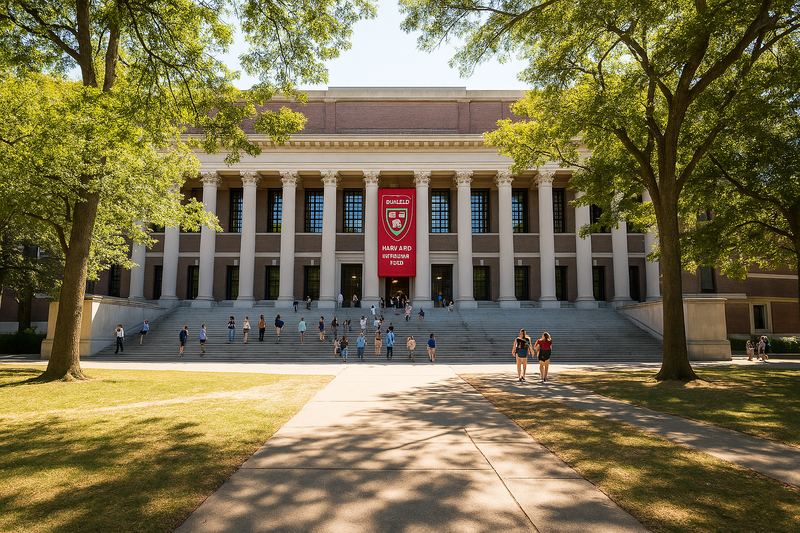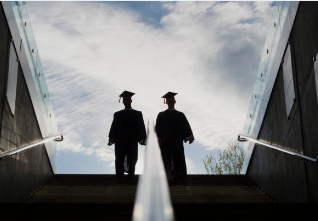Harvard Under Fire: Trump’s Federal Funding Review and the Future of Academic Freedom
Input
Modified
A Political Play or a Necessary Action? The Fallout from Antisemitism Concerns The Broader Implications for Higher Education

A Political Play or a Necessary Action?
In an unprecedented move, the Trump administration is set to review billions of dollars in federal funding to Harvard University. While this intervention may seem bizarre to many, particularly given the long history of government support for the Ivy League institution, it highlights a growing tension between the U.S. government and the nation’s most prestigious universities. Harvard, often seen as a bastion of academic excellence, is now caught in the crossfire of political disputes that could shake the foundations of its financial and academic operations.
The controversy centers around allegations of antisemitism at the university, which have recently sparked heated debates across the political spectrum. Federal agencies are reportedly investigating nearly $9 billion in contracts and grants linked to Harvard, threatening to revoke or reduce these funds. The move by the Trump administration has raised eyebrows, with many questioning the motivations behind this intervention and the broader implications for higher education in the U.S.
To understand the full implications of this review, it's essential to look at the political context in which it is happening. President Trump’s administration has often clashed with academic institutions, accusing them of harboring liberal biases and failing to adhere to principles of fairness and neutrality. In recent years, this conflict has only intensified, with Trump targeting universities over issues ranging from free speech to the handling of political activism on campus.
In this latest episode, the review of federal funding to Harvard comes in the wake of a series of incidents involving antisemitic actions and rhetoric on campus. The allegations against the university have sparked outrage, particularly among Jewish organizations and supporters of Israel, who feel that the institution has failed to adequately address the issue. For Trump, this presents an opportunity to take a firm stance against what he perceives as political correctness gone awry in academia.
From the administration's perspective, the review is not just about the antisemitism allegations themselves, but about sending a message to other universities across the country. By targeting Harvard—an institution that holds significant influence and prestige—the Trump administration is making a statement about the direction of higher education in America. For many conservatives, this is seen as a long-overdue challenge to the power of universities that they believe have become hotbeds of left-wing activism and political correctness.

The Fallout from Antisemitism Concerns
The allegations of antisemitism at Harvard are not new, but they have gained renewed attention in recent months. A series of controversial incidents, including inflammatory speeches and actions by student groups, have raised questions about the university’s commitment to combating hate and discrimination. In response to these events, some federal agencies have launched investigations into whether the university has violated federal policies regarding discrimination.
One of the primary concerns is whether Harvard’s leadership, including President Lawrence Bacow, has done enough to address the issue. In a recent statement, Bacow expressed a firm resolve to protect free speech and academic freedom on campus, but he also acknowledged the importance of combating antisemitism and ensuring a safe environment for all students. However, critics argue that Harvard’s response has been inadequate and that the university has allowed a climate of intolerance to fester.
The Trump administration’s decision to review the federal funding in light of these concerns is seen by many as a direct response to what they perceive as a failure by the university to live up to its responsibilities. The nearly $9 billion in contracts and grants at stake represent a significant portion of Harvard’s budget, and losing such funding could have a devastating impact on the university’s operations.

The Broader Implications for Higher Education
This review of Harvard’s funding is part of a broader trend of growing scrutiny of universities and their political activities. In recent years, political leaders have increasingly focused on the role that academic institutions play in shaping public discourse and influencing political outcomes. Some, like President Trump, argue that universities have become too politically biased, particularly in their handling of controversial issues like free speech, race, and religion.
While this review is targeted specifically at Harvard, the implications extend far beyond the university itself. Other academic institutions across the country may find themselves facing similar scrutiny, particularly if they are perceived as allowing political activism or intolerance to flourish on their campuses. The risk is that universities could become more cautious in their approach to controversial issues, choosing to avoid political activism altogether in order to protect their funding.
In a sense, this “no touch” policy may not be about outright support, but about avoiding political interference. If universities like Harvard stop supporting certain political movements or take a more neutral stance on divisive issues, it could be seen as an attempt to placate government officials and safeguard their access to federal funds. While this may not be an explicit endorsement of the Trump administration’s policies, it could signal a shift in the way that universities engage with political issues in the future.
One of the most significant consequences of this intervention could be a shift in the way that universities approach political activism and support for social justice causes. In recent years, Harvard and other Ivy League institutions have been at the forefront of various political movements, particularly those related to civil rights, LGBTQ+ rights, and climate change. However, the increasing pressure from the Trump administration and other conservative political forces may force these institutions to reassess their positions.
If universities like Harvard begin to feel the weight of government scrutiny and the potential loss of federal funding, they may opt to distance themselves from controversial political causes. This could manifest in a number of ways, from restricting student groups that engage in political activism to refraining from hosting speakers who espouse controversial views. Such a shift would represent a significant departure from the tradition of academic freedom, where universities have historically been places for the free exchange of ideas, regardless of their political implications.
For students and faculty members who support progressive causes, this could be seen as a major setback. The very idea of a university as a space for political engagement and activism could be undermined by the fear of losing federal funding. On the other hand, some may argue that this shift could restore a sense of balance to campuses that have, in their view, become too politically charged.
The Trump administration’s decision to review billions in federal funding to Harvard University is a stark reminder of the growing political divide between academia and the government. Whether this review is seen as an overreach or a necessary action to address real concerns about antisemitism and political activism on campus, the consequences for Harvard and other universities are likely to be profound.
If Harvard is forced to alter its approach to political activism in order to protect its funding, it could have far-reaching implications for the entire landscape of higher education in the U.S. Universities may increasingly shy away from taking strong political stances or supporting controversial movements, opting instead for a more cautious, neutral approach. This shift could fundamentally change the way that universities engage with political issues and shape public discourse in the future.
As the situation continues to unfold, the nation watches closely, waiting to see how the Trump administration’s actions will impact the future of academic freedom and political expression in America’s most prestigious institutions. The question remains: will universities like Harvard continue to stand at the forefront of social change, or will they be forced to adopt a more conservative stance in order to preserve their financial standing and political independence? Only time will tell.





















